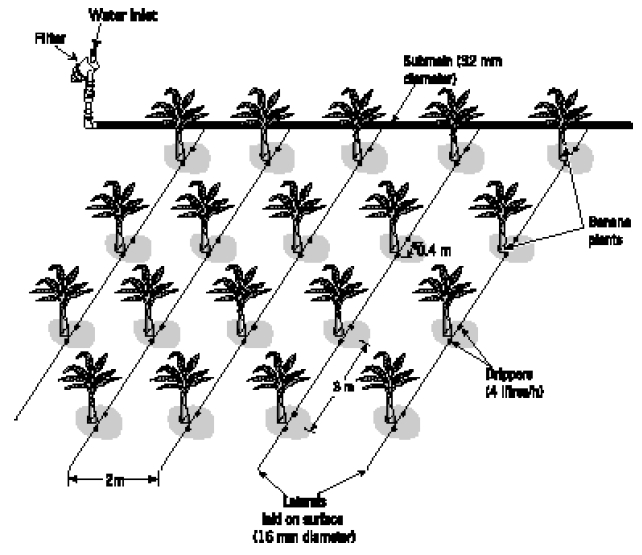KARI orchard drip

At the National Agricultural Research Laboratories (NARL) in Nairobi, KARI has set up a simple orchard system that irrigates 500 banana and 60 passion fruit plants. The system facilitates watering of plants at a rate equivalent to their consumptive water use.
The system uses polyethylene pipes for supply lines and for the drip laterals. The polyethylene pipes are sized according to the required carrying capacity. On-line button drip emitters are inserted on the drip lateral to provide two drip emitters per plant. The use of on-line button drip emitters allows for fitting to take place in the orchard itself with varying spacing of plants. The advantage of the system lies in its simplicity.
For further information contact the Small Scale Drip Irrigation Project, Kenya Agricultural Research Institute.
Research continues at NARL on small-scale orchard drip irrigation, and demonstrations and advice are available on request to NARL.
Construction, operations and maintenance
System components
- Gate valve
- ∫” screen filters
- Polyethylene pipes
- Button drip emitters
- Connecting tubing
- Hole puncher.
Assembly instructions
- Establish the total length of laterals and the number of plants per lateral required for the orchard. Count the number of laterals and measure the distance between them.
- Locate the best position to connect to the water source. Measure the distance from the water source to the orchard header pipe.
- Determine the available pressure and reliable supply rate.
- Size the header lines according to the number of drip laterals served.
- Select the most suitable dripper for the available water pressure.
Acknowledgements
- Sijali, Isaya V. DRIP IRRIGATION: Options for smallholder farmers in eastern and southern Africa. RELMA, 2001.
